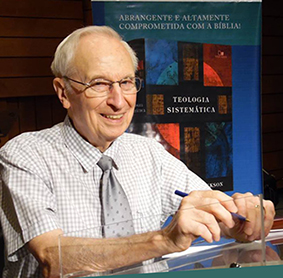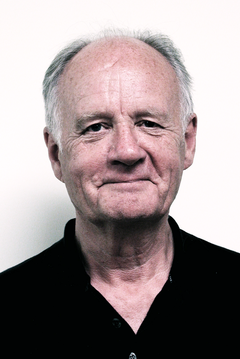 As I was reading the Bible one morning this week, I had “a moment.” Not a major moment, a life-transforming moment, not a remember-this-for-the-rest-of-my-life-because-God-spoke-to-me moment, not a spiritual experience moment, but a moment nonetheless. The passage I was reading was Exodus 31, where the Lord tells Moses about Bezalel and Oholiab, two master craftsmen who are to take charge in the construction of all that God has commanded Moses to build with respect to the tabernacle and its furniture, as well as the high priest’s garments and accoutrements.
As I was reading the Bible one morning this week, I had “a moment.” Not a major moment, a life-transforming moment, not a remember-this-for-the-rest-of-my-life-because-God-spoke-to-me moment, not a spiritual experience moment, but a moment nonetheless. The passage I was reading was Exodus 31, where the Lord tells Moses about Bezalel and Oholiab, two master craftsmen who are to take charge in the construction of all that God has commanded Moses to build with respect to the tabernacle and its furniture, as well as the high priest’s garments and accoutrements.
I love these kinds of moments—an “ah-ha” moment, a moment of inspiration or understanding, of fresh vision, of renewed understanding, of seeing something I had not quite seen before in the scriptures. It came simply as an insight or an idea, yet perhaps from the one Spirit who not only inspired the scriptures in ages past but continues to confirm them and speak through them afresh in every generation. The passage tells of God equipping Bezalel with his Spirit. I have heard that this is the first occasion in the Hebrew Bible in which a person has been said to be “filled with the Spirit of God” (v. 3). The whole passage reads,
The Lord spoke to Moses: See, I have called by name Bezalel son of Uri son of Hur, of the tribe of Judah: and I have filled him with the Spirit of God, with ability, intelligence, and knowledge in every kind of craft, to devise artistic designs, to work in gold, silver, and bronze, in cutting stones for setting, and in carving wood, in every kind of craft. Moreover, I have appointed with him Oholiab son of Ahisamach, of the tribe of Dan; and I have given skill to all the skilful, so that they may make all that I have commanded you. … They shall do just as I have commanded you.
The question raised by this passage concerns whether this infilling of the Holy Spirit was given to Bezalel specifically for the task of construction of the tabernacle and all that that involved, or whether it was a more general filling which enabled him to become the craftsman he was.
I have always simply assumed that God was equipping Bezalel for this particular task. This view understands the anointing of the Spirit as the empowerment of God’s people for particular forms of service, mainly leadership or prophecy in the Old Testament, or a broader range of activities in the New Testament. In particular, then, this work of the Spirit falls under the redemptive work of the Spirit in the lives of those who are already God’s people.
The “moment” I had last week was a sudden realisation that what we often understand as the innate talents and abilities of a person—which must be developed, honed and trained, to be sure—are, or at least may be, the very specific gifts of the Holy Spirit to each individual. This passage suggests that in the case of Bezalel, Oholiab and “all the skilful,” the very skills that these possess, as well, therefore, as the initial abilities which make such skill development possible, are the gift of the Holy Spirit. This indicates further the creational presence of the Holy Spirit with every person, assuming, legitimately I believe, that every person has some skill, some talent, some orientation or ability which singles them out as gifted and unique. It may be an ability in the realm of mathematics, sports or colours, of abstract thought or mechanics, of music, comedy, baking, or any other innumerable possibilities.
If my meditation has any validity, this verse suggests that
- There is no person devoid of the Spirit’s grace in a creational if not a redemptive sense. Given that the divine ruah is the life principle in humanity (see Genesis 2:7; Psalm 104:29-30), there is no person outside of the Spirit’s creational ministry in any case; but this adds an additional layer of meaning to that ministry.
- The talents and abilities of people are not simply natural gifts, but gifts of grace given by the creator Spirit. These may be distinguished, of course, from the “spiritual gifts” in passages such as 1 Corinthians 12:4-11, which are special gifts given to members of the body of Christ for evangelism and edification. But they are gracious gifts nonetheless.
- God gives these gifts as means by which we might join God in his creative work. Each of the abilities mentioned in the text are creative expressions, intended for the worship, service and glory of God. More broadly, however, they are also the kinds of work which contribute to the common good of the community generally.
- Although the text speaks particularly of various crafts, the idea might legitimately be extended to other arts, and to all forms of work which add to the commonwealth.
- The gifts, talents and abilities of others are gifts to be welcomed and celebrated as the diverse and empowering grace of the Spirit—with the acknowledgement, of course, that such gifts can be turned in directions never intended by the Spirit.
- Our gifts and talents are to be nurtured and developed so that we might become skilful in our work, contributing as best we can as valuable members of our society—though our value as persons can never be reduced to the contribution we are able—or unable—to make.
- That our work—when we are using and developing the grace given to us—is divine service and divine stewardship, a means of glorifying God. While we should never worship our work, our work may indeed become worship.
In sum, work is a dignified activity, a means by which we not only express the innate and developed gifts with which we have been endowed, but contribute to the common good and glorify the God who has so graced us. Work, then, as a “structure” within the created order, is to be welcomed and celebrated. Further, if at all possible, our work should be an expression of those particular gifts that we have received. I suspect that then we will not only make a contribution, but will find a degree of satisfaction and joy in our work that may otherwise escape us. This is not always possible in formal employment. If so, perhaps we can find other ways of bringing these gifts to expression in life-affirming, community-building and God-glorifying ways.




